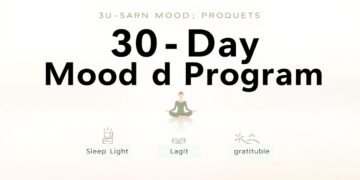In today’s indoor-centric world, many of us spend hours glued to screens, missing out on the essential benefits of sunlight exposure. Did you know that insufficient daylight can impact your mental health, disrupt your circadian rhythm, and even affect your vision?
Research shows that spending time outdoors can boost your mood, improve sleep, and support overall well-being. Yet, with rising myopia rates and busy schedules, it’s easy to overlook this simple yet powerful habit. Tools like the Apple Watch now make it easier to track your daylight intake, helping you stay mindful of your outdoor time.
This article explores how balancing your sun exposure can protect your eyes, enhance brain function, and promote better health. Let’s dive into practical ways to make sunlight a priority in your daily routine.
Key Takeaways
- Sunlight supports mental health and regulates your internal clock.
- Indoor lifestyles contribute to rising myopia rates globally.
- Technology like the Apple Watch can help track daylight exposure.
- Balanced sun exposure improves sleep and overall well-being.
- Small changes in routine can make a big difference in health.
Why Nature and Sunlight Are Essential for Mental Wellness
Modern lifestyles often keep us indoors, cutting us off from the vital benefits of sunlight. This lack of exposure can impact our mental health, disrupt our circadian rhythm, and even affect our overall well-being. Let’s explore the science behind why spending time outdoors is so crucial.
The Science Behind Sunlight and Mental Health
Sunlight plays a key role in our body’s functions. When UVB rays hit our skin, they trigger the synthesis of vitamin D3, which supports bone health and immune function. But sunlight does more than just boost vitamin levels.
Morning sun exposure helps regulate the serotonin-melatonin cycle. Serotonin, often called the “feel-good” hormone, is produced in response to light. This process helps stabilize mood and improve sleep patterns. Dr. Garven’s research highlights how sunlight aligns our circadian rhythm, keeping our internal clock in sync.
How Nature Impacts Emotional Fitness
Spending time outdoors isn’t just about sunlight. Nature itself has a calming effect on our brain. Studies show that being in green spaces reduces stress and enhances emotional resilience. For kids, outdoor play can lower the risk of myopia, especially when screens are kept at a distance.
The Valencia study reveals how seasonal changes affect vitamin D synthesis. In summer, just 10 minutes of midday sun can suffice, while winter may require up to two hours. This highlights the importance of adapting our routines to the seasons.
By balancing indoor and outdoor activities, we can protect our eyes, boost our mental health, and improve our overall health. Small changes, like taking a walk during lunch, can make a big difference.
How to Use the 30-Day Nature & Sunlight Minutes Tracker
Understanding how much daylight you’re getting is easier than ever with modern tools. By tracking your outdoor time, you can ensure you’re meeting your daily goals and reaping the benefits of sun exposure. Let’s explore how to set up and use these tools effectively.
![]()
Setting Up Your Tracker
To get started, enable daylight tracking on your Apple Watch (watchOS 10+ required). Open the Health app, navigate to Browse > Other Data > Time in Daylight, and follow the prompts. This feature measures the amount of light you’re exposed to throughout the day.
For more advanced tracking, consider the Daylight Goals app. It allows you to set lux thresholds for accurate exposure counting. You can also use the sun compass to plan your outdoor time based on UV index forecasts.
Daily Goals and Progress Monitoring
Start small by aiming for 10 minutes of sun exposure daily. Gradually increase this by 10-minute increments over 30 days. This progressive approach helps your body adapt and ensures consistency.
For families, the app supports multi-user tracking via managed Apple Watches. This way, everyone can monitor their daylight intake and stay on track. Lock screen widgets and Health app integration provide real-time feedback, making it easy to stay motivated.
By using these tools, you’ll gain valuable insights into your outdoor time and make it a priority in your daily routine. Small changes can lead to big improvements in your health and well-being.
Benefits of Tracking Your Sunlight Exposure
Monitoring your daylight intake can unlock significant improvements in your well-being. By keeping track of your time outdoors, you gain insights into how it affects your sleep, mood, and overall health. Let’s explore the key advantages of this practice.

Improved Sleep and Circadian Rhythm
Morning sun exposure helps reset your internal clock by suppressing melatonin. This process, known as circadian entrainment, ensures your body stays in sync with natural light cycles. Research shows that 83% of users report better sleep latency within two weeks of consistent tracking.
Dr. Garven’s findings highlight how sunlight triggers dopamine release, reducing eye strain caused by screens. By aligning your routine with daylight, you can improve your sleep quality and wake up feeling refreshed.
Enhanced Mood and Vitamin D Levels
Sunlight boosts vitamin D synthesis, which supports bone density, immune function, and blood pressure regulation. A 2024 study found that spending over one hour in winter daylight reduces the risk of depression by 68%.
Natural light also outperforms artificial alternatives in phototherapy research. By tracking your exposure, you can ensure your body gets the right amount of sunlight for optimal vitamin levels and mental health.
Small changes, like planning outdoor activities based on UV index forecasts, can make a big difference. By prioritizing sunlight, you’ll notice improvements in your mood, energy, and overall health.
Practical Tips for Incorporating Nature into Daily Life
Incorporating more outdoor activities into your daily routine can transform your health and well-being. Whether it’s a morning walk or a family outing, small changes can make a big difference. Let’s explore practical ways to bring more nature into your day.
Morning Sunlight Rituals
Starting your day with sunlight can set a positive tone. Dr. Garven recommends 10-30 minutes of bare skin exposure in the morning. This helps regulate your circadian rhythm and boosts vitamin D levels.
Try a 5-phase morning routine: barefoot grounding, a 10-minute sun gaze, and dynamic movement. These simple steps can improve your mood and energy levels throughout the day.
Family Activities to Boost Outdoor Time
Getting the whole family involved can make outdoor time more enjoyable. Consider a weekly “screen-free safari” with app-based scavenger hunts. This encourages kids to explore and reduces screen time.
Plan activities based on the sun path to maximize light exposure. This ensures everyone gets the benefits of sunlight while having fun together.
Using Technology to Enhance Your Experience
Technology can help you make the most of your outdoor time. Use apps like Daylight Goals to track your exposure and set daily goals. These tools provide real-time feedback and keep you motivated.
Smart home integrations, like circadian lighting systems, can sync with your tracker data. This ensures your indoor environment supports your outdoor habits, enhancing your overall health.
By combining these tips, you can create a balanced routine that prioritizes nature and sunlight. Small changes can lead to significant improvements in your well-being.
Conclusion: Embrace the Power of Nature and Sunlight
Embracing the outdoors can significantly enhance both physical and mental well-being. Research shows that spending time outside can prevent 50% of myopia cases in children, with a recommended standard of two hours daily. Tools like the 30-Day Nature & Sunlight Minutes Tracker play a dual role in protecting vision and optimizing mental health.
Upcoming features, such as AI-powered exposure recommendations in the Daylight Goals app, will make tracking even more effective. We challenge you to join our 30-day community initiative, sharing progress and supporting each other in this journey.
Pair your tracker use with quarterly vitamin D blood tests to ensure optimal levels. As the Beatles wisely sang, “Here comes the sun,” let’s make sustainable habits that brighten our lives. Start today and experience the profound benefits of balanced sun exposure for your health and emotional fitness.
FAQ
Why is sunlight exposure important for mental health?
Sunlight helps regulate your circadian rhythm, which controls sleep patterns and mood. It also boosts vitamin D levels, which are linked to improved brain function and emotional well-being.
How much time should I spend outdoors daily?
Aim for at least 20-30 minutes of outdoor time each day. Morning sun exposure is especially beneficial for setting your internal clock and improving overall health.
Can I get the same benefits from supplements instead of sunlight?
While vitamin D supplements can help, they don’t fully replace the benefits of natural light. Sunlight also supports your circadian rhythm and mental health in ways supplements can’t.
What are some easy ways to incorporate nature into my routine?
Start with simple habits like a morning walk, eating lunch outside, or spending time in a park. Family activities like hiking or gardening can also boost your outdoor time.
How does tracking my sunlight exposure help?
Tracking helps you stay consistent and ensures you’re getting enough light. It also lets you monitor progress and notice improvements in sleep, mood, and energy levels.
What if I live in an area with limited sunlight, especially in winter?
Maximize daylight hours by spending time outside when the sun is out. Consider using light therapy boxes to mimic natural light and support your circadian rhythm during darker months.
Can kids benefit from sunlight and nature too?
Absolutely! Outdoor time supports children’s physical health, brain development, and emotional well-being. It’s a great way for families to bond while reaping the benefits of nature.
How does sunlight affect sleep quality?
Sunlight helps regulate your internal clock, making it easier to fall asleep and wake up naturally. Consistent exposure can improve sleep patterns and overall restfulness.


